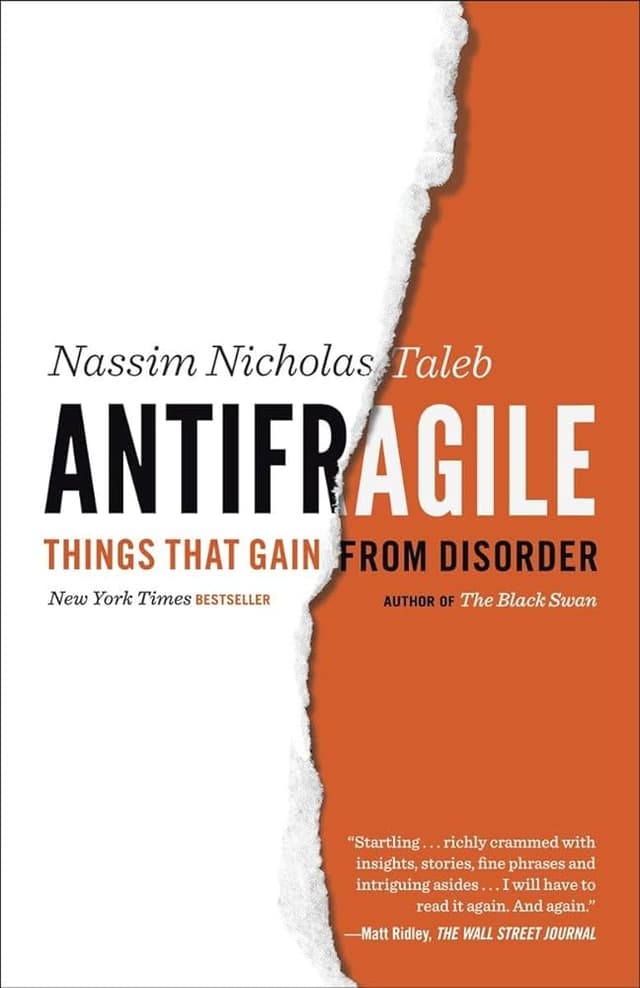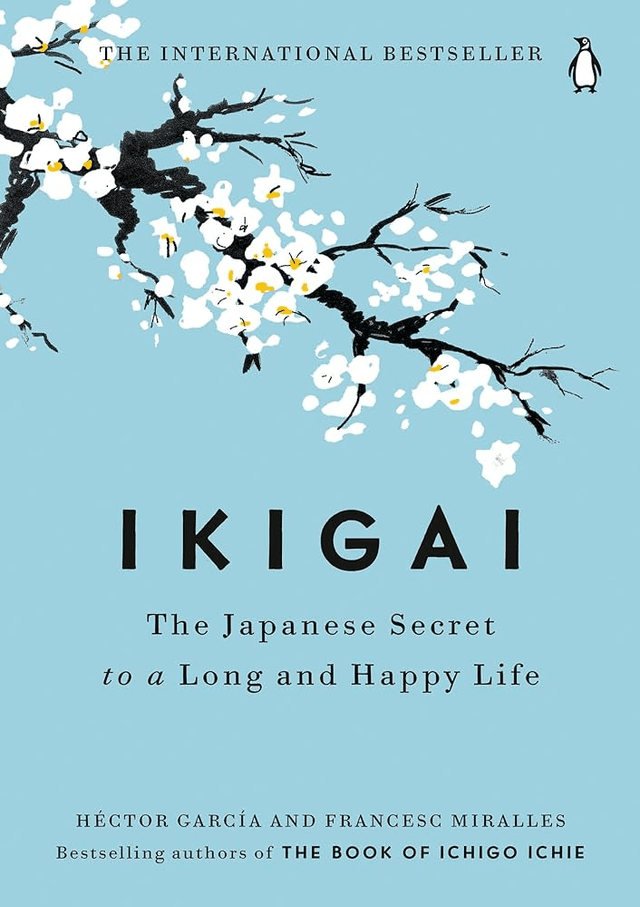Antifragile: Things That Gain from Disorder vs. Ikigai: The Japanese Secret to a Long and Happy Life
Antifragile: Things That Gain from Disorder
"Antifragile: Things That Gain from Disorder" by Nassim Nicholas Taleb is a groundbreaking exploration of systems and entities that thrive and grow stronger in the face of stress, volatility, and chaos. Taleb introduces the concept of "antifragility," which goes beyond resilience or robustness. Through a mix of philosophy, practical wisdom, and real-world examples, Taleb illustrates how embracing uncertainty and leveraging disorder can lead to success and innovation. This book is essential for anyone interested in risk management, personal development, and understanding how to benefit from uncertainty and change.
Ikigai: The Japanese Secret to a Long and Happy Life
Discover the secrets to a long, healthy, and fulfilling life with "Ikigai: The Japanese Secret to a Long and Happy Life" by Héctor García and Francesc Miralles. This insightful book delves into the Japanese concept of ikigai, or a "reason for being," which is believed to be a key factor in the remarkable longevity of the residents of Okinawa, a Japanese village known for having the world’s highest percentage of centenarians. Through interviews with these vibrant centenarians, the authors uncover how the principles of ikigai—where passion, mission, vocation, and profession intersect—contribute to their happiness and longevity. The book reveals the residents' daily practices, from their nutrient-rich diets and active lifestyles to their strong community bonds and purposeful work. "Ikigai" provides practical advice and tools to help readers discover their own ikigai, offering a blend of cultural wisdom and actionable steps towards a life filled with purpose, health, and joy. This bo...


Reviews
Reviewed on 2/29/2024
I remember reading Antifragile when it first came out and it made a huge impression. It changed the way I think in plenty of subtle ways. I've been rereading Nassim Nicholas Taleb recently, starting with Black Swan. I really want to reread Antifragile this year too.
Reviews
| Item | Votes | Upvote |
|---|---|---|
| Innovative and original concepts | 1 | |
| Practical applications across various fields | 1 | |
| Engaging and thought-provoking narrative | 1 |
| Item | Votes | Upvote |
|---|---|---|
| Taleb's writing style can be polarizing | 1 |
| Item | Votes | Upvote |
|---|---|---|
| Engaging and accessible writing style | 1 | |
| Motivating and thought-provoking | 1 | |
| Provides actionable advice on living a healthier life | 1 |
| Item | Votes | Upvote |
|---|---|---|
| A lack of cited sources and references to back up claims | 1 | |
| Certain concepts and advice may seem repetitive | 1 | |
| Sometimes unfocused and strays from the main theme | 1 |
Frequently Asked Questions
'Antifragile' by Nassim Nicholas Taleb focuses on how systems can thrive in chaos and uncertainty, making it particularly beneficial for understanding risk management and volatility. In contrast, 'Ikigai' emphasizes finding purpose and happiness in life, which may not directly address risk management but offers valuable insights into well-being. Therefore, if your primary interest is in risk management, 'Antifragile' would be more beneficial.
'Ikigai' provides actionable advice on living a healthier and more fulfilling life, focusing on daily practices that contribute to happiness and longevity. While 'Antifragile' offers innovative concepts that can be applied across various fields, its focus is more on theoretical frameworks rather than direct daily applications. Thus, for practical applications in everyday life, 'Ikigai' is the better choice.
'Ikigai' is noted for its engaging and accessible writing style, making it easy for readers to connect with the material. On the other hand, 'Antifragile' has a more polarizing writing style that may not resonate with all readers. Therefore, if you prefer a more straightforward and engaging narrative, 'Ikigai' may be the better option.
Both books offer valuable insights for personal development, but they approach it from different angles. 'Antifragile' encourages readers to embrace uncertainty and leverage chaos for growth, which can be transformative for personal resilience. In contrast, 'Ikigai' focuses on finding purpose and joy in life, which is essential for overall well-being. Depending on whether you seek to enhance resilience or find purpose, either book could be considered better for personal development.
'Antifragile: Things That Gain from Disorder' by Nassim Nicholas Taleb is a groundbreaking exploration of systems and entities that thrive and grow stronger in the face of stress, volatility, and chaos. Taleb introduces the concept of 'antifragility,' which goes beyond resilience or robustness. Through a mix of philosophy, practical wisdom, and real-world examples, Taleb illustrates how embracing uncertainty and leveraging disorder can lead to success and innovation. This book is essential for anyone interested in risk management, personal development, and understanding how to benefit from uncertainty and change.
Pros of 'Antifragile: Things That Gain from Disorder' include its innovative and original concepts, practical applications across various fields, and an engaging and thought-provoking narrative. However, a con noted by some readers is that Taleb's writing style can be polarizing.
Nassim Nicholas Taleb is a renowned scholar, statistician, and former trader known for his work on probability, uncertainty, and risk management. He is the author of several influential books, including 'The Black Swan,' 'Fooled by Randomness,' and 'Antifragile.' Taleb's work often focuses on the limits of knowledge and the impact of rare, unpredictable events.
'Ikigai: The Japanese Secret to a Long and Happy Life' by Héctor García and Francesc Miralles explores the Japanese concept of ikigai, or 'reason for being.' The book examines how this principle contributes to the remarkable longevity and happiness of the residents of Okinawa, a Japanese village known for its high percentage of centenarians. Through interviews with these centenarians, the authors reveal how practices such as nutrient-rich diets, active lifestyles, strong community bonds, and purposeful work contribute to their well-being. The book offers practical advice and tools to help readers discover their own ikigai and enhance their lives.
Pros of 'Ikigai: The Japanese Secret to a Long and Happy Life' include its engaging and accessible writing style, its motivating and thought-provoking content, and the actionable advice it provides on living a healthier life. However, some cons include a lack of cited sources and references to back up claims, certain concepts and advice that may seem repetitive, and moments where the book sometimes feels unfocused and strays from the main theme.
'Ikigai: The Japanese Secret to a Long and Happy Life' is written by Héctor García and Francesc Miralles. Héctor García is a Spanish author who has lived in Japan for many years and writes about Japanese culture. Francesc Miralles is a Spanish author and journalist specializing in psychology and spirituality.
'Ikigai: The Japanese Secret to a Long and Happy Life' offers practical advice and tools to help readers discover their own ikigai. This includes guidance on aligning passion, mission, vocation, and profession to find deeper satisfaction in everyday life. The book also shares insights into maintaining a nutrient-rich diet, leading an active lifestyle, fostering strong community bonds, and engaging in purposeful work.



















